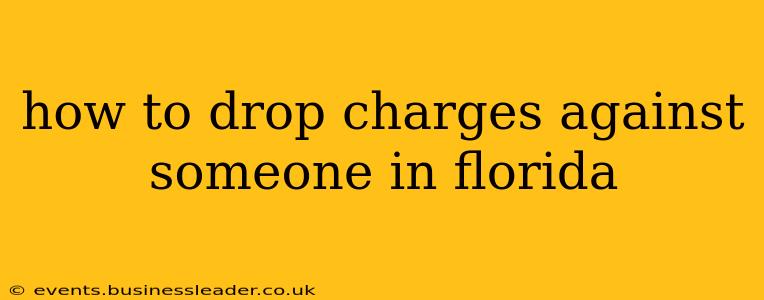Dropping charges against someone in Florida is a complex process that depends heavily on the type of charges, the stage of the legal proceedings, and the involvement of various parties. There's no single, simple answer, as the path forward varies significantly. This guide outlines the key scenarios and procedures. Remember, legal advice should always come from a qualified Florida attorney. This information is for educational purposes only and not a substitute for legal counsel.
Who Can Drop Charges?
The ability to drop charges rests primarily with the prosecutor's office, not the victim. Even if the alleged victim wishes to withdraw their complaint, the State Attorney's office retains the authority to proceed with the prosecution. This is because criminal charges are considered offenses against the state, not just the individual involved.
However, there are exceptions and factors that influence the prosecutor's decision:
-
Victim's Testimony: A victim's willingness to cooperate or lack thereof heavily influences the case. If the victim recants their statement or refuses to testify, it significantly weakens the prosecution's case. However, this doesn't guarantee dismissal.
-
Lack of Evidence: If the prosecutor determines there is insufficient evidence to prove the case beyond a reasonable doubt, they may choose to nolle prosequi the charges, meaning they will not pursue the case further.
-
Plea Bargains: The defendant might negotiate a plea bargain with the prosecutor, leading to reduced charges or a dismissal in exchange for a guilty plea to a lesser offense.
What Happens After Charges are Filed?
Once charges are filed, the process typically involves:
- Arrest: If the defendant hasn't already been arrested, they may be taken into custody.
- Arraignment: The defendant appears before a judge, is informed of the charges, and enters a plea (guilty, not guilty, or no contest).
- Discovery: Both sides exchange evidence and information relevant to the case.
- Pretrial Hearings: These hearings address procedural matters, motions, and potential plea bargains.
- Trial (if necessary): If a plea bargain isn't reached, the case proceeds to trial.
Throughout this process, the prosecutor assesses the strength of their case and the likelihood of a successful conviction. The victim's cooperation and the availability of evidence significantly impact this assessment.
Can a Victim Withdraw Their Complaint?
While a victim's desire to drop charges is considered, it's not determinative. The prosecutor will evaluate all evidence and circumstances before making a decision. The victim can certainly make their wishes known, but ultimately the prosecutor decides whether to proceed.
What if the Charges are Misdemeanors?
Misdemeanor cases often have a different trajectory. In some instances, the prosecutor might be more likely to consider a victim's request to drop charges, particularly if it's a first-time offense and there's minimal evidence. But again, this is not guaranteed.
How to Contact the Prosecutor's Office?
To express your desire to have charges dropped or to inquire about the status of a case, you would need to contact the State Attorney's Office in the relevant Florida jurisdiction. Their contact information can usually be found online.
Is it Possible to File a Motion to Dismiss?
Generally, only the defendant or their attorney can file a motion to dismiss the charges. This motion argues that there is insufficient evidence, a legal defect, or another reason the case should be dismissed. The judge will then review the motion and make a ruling.
Conclusion
Dropping charges in Florida is a complex process controlled by the prosecutor's office, not the victim. While a victim's input is considered, the ultimate decision rests on the prosecutor's assessment of the evidence and the overall strength of the case. Seeking legal counsel from a qualified Florida attorney is crucial for understanding your rights and options in this situation. They can provide personalized advice based on the specifics of your case.
